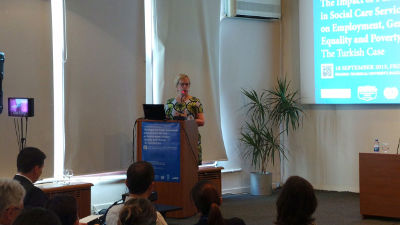Investing in early child care would generate hundreds of thousands of jobs in Turkey
Study finds investments in early child care and pre-school education could create more than 700,000 jobs in Turkey, improve gender equality in the labour market and alleviate poverty through dual earner households.Date:

Prioritising state spending to expand Turkey’s social care service infrastructure would create hundreds of thousands of new jobs, improve gender equality in the labour market and reduce poverty through dual earner households, according to a landmark study prepared by Istanbul Technical University Women’s Studies Centre and the Levy Economics Institute of Bard College, in partnership with ILO, UNDP and UN Women.
Released today in Istanbul, the study, The Impact of Public Investment in Social Care Services on Employment, Gender Equality and Poverty: The Turkish Case, makes a compelling case for greater public investment in social care services rather than similar expenditures in the construction sector.
The study estimates that spending an additional 20.7 billion TRY (USD 7 billion) on early child-care centres and pre-school education – the estimated amount in order for Turkey to catch up with the average OECD pre-school enrolment rate – would have a significant impact on Turkey’s economy by creating 719,000 new jobs for women and men. This is nearly 2,5 times more jobs than a similar amount would create in the construction sector.
While 73 per cent of these social care jobs would go to women, which amounts to over 500,000 jobs, this spending would benefit men nearly as much as increased spending in construction, with over 190,000 new, largely permanent jobs.
Overall, 84 per cent of the new early child care and pre-school jobs would be permanent, compared to only 24.6 per cent permanent jobs in construction.
“Given the size of investment, it is only natural to gauge the economy-wide impact, and we did just that and here is what we found: The investment in early childhood care and preschool education (ECCPE) would create almost 720,000 jobs in the ECCPE sector and over 100,000 jobs would be in other sectors. As a benchmark, we conducted a comparative exercise with the same amount of investment, this time, in construction, one of the booming sectors in Turkey. Despite all the visual spectacles of tall structures and heavy machineries, its potential for job creation was subpar. A total 290,000 jobs would be created and about 90,000 of them would be in other sectors” says the writers of the report, İpek İlkkaracan, Kijong Kim and Tolga Kaya on a blog they have written about the findings of the study.
Increased social care spending could have a big impact on Turkey’s low rate of labour force participation for women, which at 30.8[1] per cent is the lowest among OECD countries and less than half the OECD average of 62.8 per cent – and well below Turkish men’s labour force participation rate of 76 per cent. The study found that 11.6 million of Turkey’s 20 million women outside the workforce cited full-time homemaking responsibilities as the main reason they were out of the job market.
“UN Women recognizes the heavy responsibility of unpaid care and domestic work for women that limit the types of work that they can undertake and reinforce their socio-economic disadvantage. Investing in affordable gender-responsive social services such as quality childcare services can enable women to enter and remain in the labour market when their children are young if they choose to,” says Ingibjorg Gisladottir, UN Women Regional Director for Europe and Central Asia and representative to Turkey.
Additional social care spending would also have a bigger impact on unemployment than similar construction spending, creating more than 250,000 new jobs for Turkey’s unemployed. The study also notes that offering working-age, poor women with young children access to early childhood care and pre-school education would potentially reduce Turkey’s poverty as much as 1.14 per cent.
The report’s finding have implications far beyond Turkey according to its authors, “We believe that beyond the Turkish context, the results of this study carry implications for policy debates also in other countries of the region, where a social care infrastructure is lacking and there is ample space for expansion of early child care and pre-school education and other social care service subsectors.”
Notes
[1]Turkish Statistical Institute (Turkstat), 2014